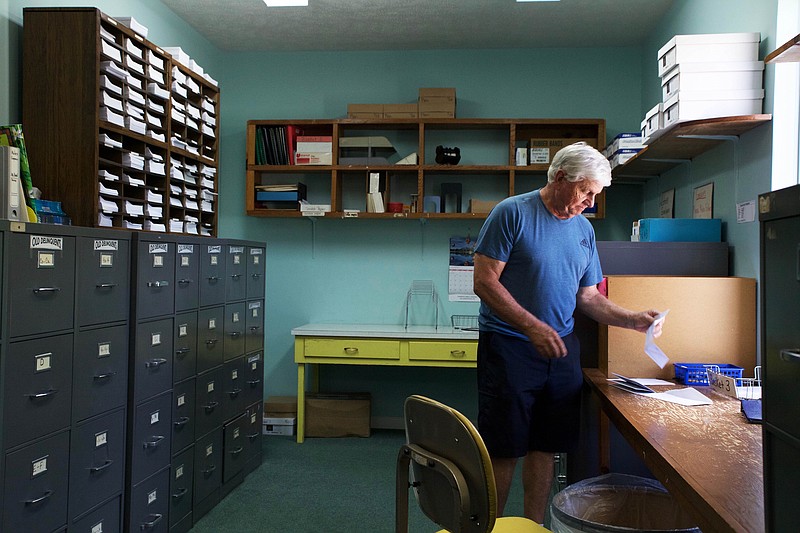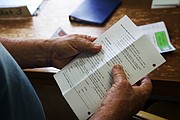The program began in the winter of 1970 with a simple mission: Teach people the Bible with simple lessons sent through the mail.
Nearly 50 years and more than 330,000 students later, the world may have changed but the program has not. It is the same Bible. The same lesson format. And the same mail delivery method.
The lessons and the letters that have spanned decades are part of the Bible Correspondence Course run by Mt. Leo Church of Christ in McMinnville, a town of 13,605. The entire operation fits in a narrow room adjacent to the church office, its blue walls covered by mounted wooden organizing bins and more than a dozen filing cabinets.
Each lesson, sent three at a time to a student, include readings and related questions that students fill out and return to the church. Once the lessons are returned and graded, volunteers like Terry Mullican, a Mt. Leo elder, folds three more lessons into an envelope for the mail. The free course is 30 lessons total and those who finish it receive a completion certificate.
"We don't really do any advertising," Mullican said. "Nothing on a statewide basis or a national basis."
Yet, the church receives about 1,000 new students every year, mostly through word of mouth among current or former students. Hosts of the International Gospel Hour radio program also talk about it.
Through June, more than 330,000 students have participated in the course since its beginning, said Trent Key, Mt. Leo's minister. Those students have included people living in McMinnville, people in other states and even other countries.
While about 10% of the students who start the course get a completion certificate, just reaching more people with Bible lessons is central to the church's mission, Key said.
"This allows us to be personally involved in mission efforts outside of our state, our community and proving to be even worldwide," Key said. "There's really no way to measure how effective it's been. We'll find out more about that on eternity's side."
The effort began in January 1970 by the minister W.E. Skipper for the purpose of teaching local church members about the Bible and hopefully touching a few non-church-going locals, Key said. The original goal was to reach a total of 500 people in the first year.
"My understanding was that was a liberal estimate for that time frame," Key said. "Some 'dreamers,' as they've categorized them throughout the years, thought maybe we'd reach a thousand people."
The church met its 1,000-person high-water mark by September of that year. By mid-1971, the program had multiplied to reach 226 cities, 29 states and two foreign countries. Today, students have come from all 50 states, 31 countries and nearly every prison system, Key said.
Despite the invention of mobile phones, email and same-day delivery, the method of correspondence between Mt. Leo's Bible class and world has not changed. The program remains lessons sent through the mail, return envelope included.
"We tried to look at going online but we found it wasn't as successful," Mullican said.
Many of the students are elderly and may not be comfortable using a computer, Mullican said. Since the course also sends letters to students in prisons, mail remains an effective way of reaching them. The only major adjustment to the program in recent years was the church adding a sign-up form to its website.
The price of the program has risen with the increasing price of postage, but the church has kept the course free, Key said. The program is funded by the church community and last year cost Mt. Leo more than $3,000.
Volunteer graders come to the church every day, each assigned to a desk to grade completed lessons and package the next set for students. Wilma Henegar spends most Thursdays in the room grading lessons. She can grade the lessons of people who understand the Bible in about 10 minutes, she said. Those who are struggling with the lessons take a lot longer.
Henegar said the work is important, even if she does not see how the lessons may change people.
"Anytime that you can help someone like that - sometimes it brings them to Christ - you just never know," she said. "... Anytime I can do something that I think can bring somebody to Christ, I'll be there."
Henegar's parents were volunteers in the program, too. Today, their picture hangs above two filing cabinets in one corner, among a memorial for the 34 volunteers who have passed.
Kent Killian, who has volunteered with the program for about 30 years, said the volunteers who show up week after week are what make the program special. For example, students have written that they do not have a church in their home and the volunteers have made connections for people on the other side of the country, he said.
The work is all about guiding people, Killian said.
"It's the church's work," he said. "The job is to reach the lost and it's a way we went about doing it. It was a way that you could reach people and teach them."
Sometimes students write questions on their lessons, such as, if God promised Noah there would be no more floods, why are there floods today? Those questions go directly to the minister Key, who said he points people back to scripture rather than giving his opinion.
The answers are all there in the Bible, Key said. Some people just need help studying it.
Contact Wyatt Massey at wmassey@timesfreepress.com or 423-757-6249. Find him on Twitter @News4Mass.

